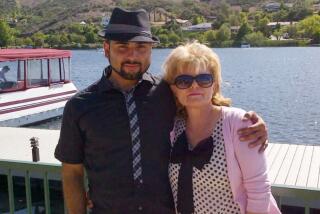$125,000 Awarded in Veteran’s Botched-Biopsy Death Riles Kin
- Share via
LAGUNA BEACH — A federal judge has awarded $125,000 to the mother of a decorated Vietnam War veteran who died after a botched biopsy at a military hospital, an amount his family on Friday called a “punch in the face.”
Richard Lee Hadd, 45, of Laguna Beach, suffering from alcohol-related problems, checked himself into the Long Beach Veterans Administration Medical Center in 1991 and agreed to let doctors take a microscopic sample from his liver. Instead, doctors biopsied the pancreas and cut an artery, causing him to bleed to death less than a day later, according to the lawsuit filed by Hadd’s mother, Audrey.
Government attorneys did not contest liability in Hadd’s death, leaving only the issue of damages to be decided by U.S. District Judge John G. Davies in Los Angeles.
Robert Hadd, who ran a plumbing business with his twin brother, called the judge’s decision “absolutely wrong.”
“He did a hell of a lot for his country,” Robert Hadd said of his brother Friday. “There are a lot of people living today who wouldn’t be if it weren’t for my brother.”
Peter A. Seidenberg, an attorney representing Audrey Hadd, said he was disappointed the judge did not award the maximum $250,000 allowed by state law for non-economic damages stemming from “loss of society, comfort and protection.” Hadd’s mother had been seeking only non-economic damages.
“With all due respect to the court, $125,000 doesn’t even begin to reflect Richard’s value to his mother,” Seidenberg said. “It’s a sad end to what I consider a brave and honorable life. The guy was my hero, I’ll tell you that.”
In a seven-page ruling made public Friday, the judge ruled that Richard Hadd’s “life expectancy was limited because of a long history of alcohol abuse, and that he would have been ill during much his remaining life.”
Medical experts, the judge noted, testified that Hadd may have lived two to three years, although his family contended he had stopped drinking and could have lived longer.
The judge also found the geographic distance between Hadd and his widowed mother in Arkansas to be a factor in deciding the award. Audrey Hadd said her son had planned to move in with her to help his ailing father, who died of a heart attack last summer. But the judge said there was “no substantial evidence” that Hadd intended to move in with his mother.
“The geographic distance and decedent’s deteriorating health and psychiatric problems interfered with the ‘society, comfort and protection’ which decedent might have offered his mother,” the judge wrote.
Both sides had agreed in April to let the judge take the case under submission, rather than hold a non-jury trial.
The U.S. attorney’s office, which represented the government in the lawsuit, declined to comment on the judge’s decision.
Robert Hadd said the ruling came as a shock, and that the family was expecting a hearing before the judge next week at which they could argue their case in person. Audrey Hadd was flying to Orange County Friday evening especially for the hearing, her son said.
“We did not get our day in court,” Robert Hadd said. “And I think that’s terrible.”
With his small and wiry size, Richard Lee Hadd became what’s known as a “tunnel rat” soon after joining the U.S. Army in 1963 after he was graduated from high school. His first assignments took him deep below the jungle floor into tunnels built by the Viet Cong to hide weapons, and themselves.
He retired from the Army in 1985 with Silver and Bronze stars, and about a dozen other commendations. He settled with his twin brother in Southern California and never married.
Family members say Hadd’s war experience contributed to his drinking problem, but they said he never let his drinking get in the way of work or responsibilities.
Hadd, who had cirrhosis of the liver, was admitted to the hospital about 2 1/2 weeks before his death. Robert Hadd said his brother had given up drinking “cold turkey” and had suffered a seizure.
Fearing that he might have cancer, doctors ordered a liver biopsy, an otherwise routine procedure that involves removing a small amount of tissue to be tested under a microscope for presence of a disease, his family said.
But during the procedure on July 15, 1991, doctors inserted the biopsy needle into his pancreas, cutting an artery, according to the family’s lawsuit. Hadd died of internal bleeding less than 24 hours later. His death certificate lists his death as an accident caused by “laceration of artery during biopsy of pancreatic mass.”
More to Read
Sign up for Essential California
The most important California stories and recommendations in your inbox every morning.
You may occasionally receive promotional content from the Los Angeles Times.













